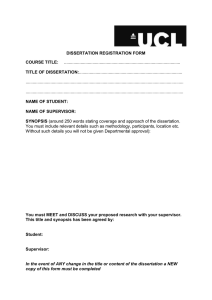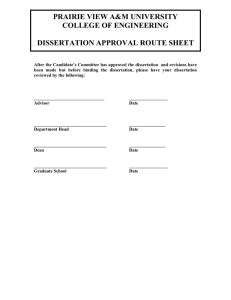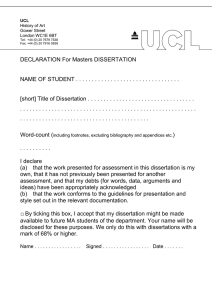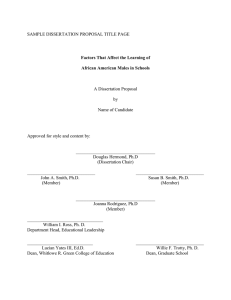HPSCGA98 Title MSc Dissertation Department of Science and Technology Studies
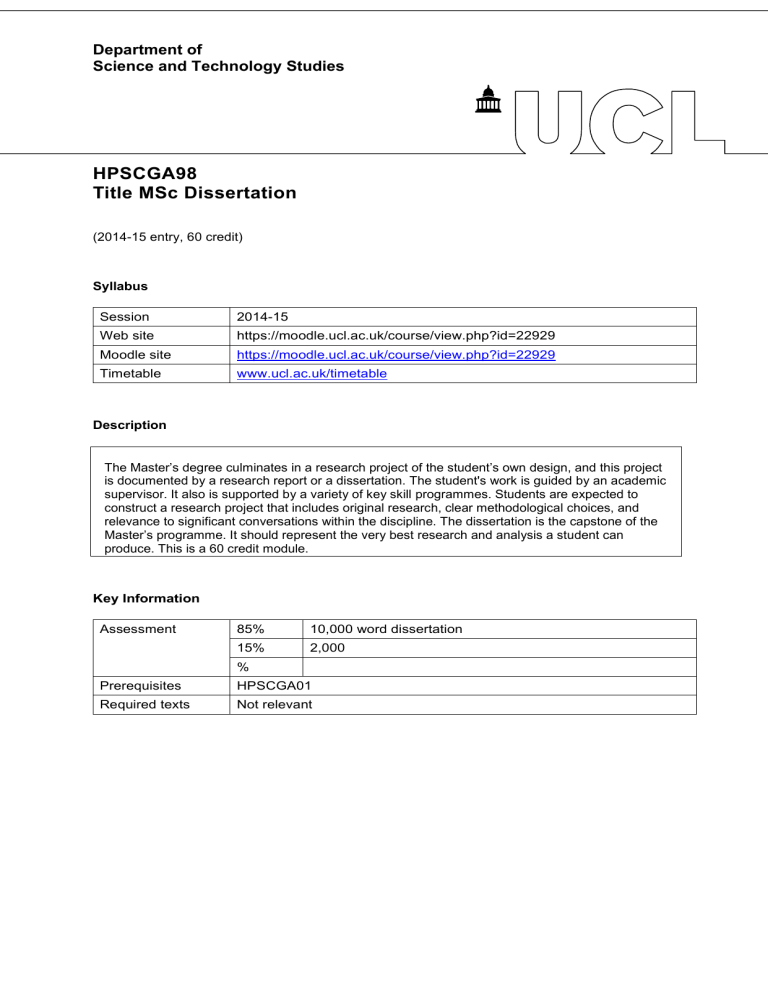
Department of
Science and Technology Studies
HPSCGA98
Title MSc Dissertation
(2014-15 entry, 60 credit)
Syllabus
Session
Web site
Moodle site
Timetable
2014-15 https://moodle.ucl.ac.uk/course/view.php?id=22929 https://moodle.ucl.ac.uk/course/view.php?id=22929 www.ucl.ac.uk/timetable
Description
The Master’s degree culminates in a research project of the student’s own design, and this project is documented by a research report or a dissertation. The student's work is guided by an academic supervisor. It also is supported by a variety of key skill programmes. Students are expected to construct a research project that includes original research, clear methodological choices, and relevance to significant conversations within the discipline. The dissertation is the capstone of the
Master’s programme. It should represent the very best research and analysis a student can produce. This is a 60 credit module.
Key Information
Assessment
Prerequisites
Required texts
85%
15%
%
HPSCGA01
Not relevant
10,000 word dissertation
2,000
HPSCGA98 Title
2014-15 syllabus
Module tutors
Module tutor
Contact
Web
Office location
Office hours:
Assistant
Contact
Office location
Office hours:
Prof. Andrew Gregory ucrhadg@ucl.ac.uk | t: 020 7679 2490 http://www.ucl.ac.uk/silva/sts/staff/gregory
22 Gordon Square, Room 1.1
Fridays 11-1 and by appointment.
None
Aims and objectives aims
The Master’s degree culminates in a research project of the student’s own design, and this project is documented by a research report or a dissertation. The student's work is guided by an academic supervisor. It also is supported by a variety of key skill programmes. Students are expected to construct a research project that includes original research, clear methodological choices, and relevance to significant conversations within the discipline. The dissertation is the capstone of the Master’s programme. It should represent the very best research and analysis a student can produce objectives
By the end of this module students should be able to:
Produce substantial written scholarship, with an original contribution to knowledge or a substantial synthesis of existing research
Demonstrate an ability to plan and execute a substantial research project
Module plan
Step 0: Advice sessions
The dissertation coordinator will organize advice sessions during Term 2. Students are strongly encouraged to discuss possible topics with potential supervisors throughout Terms 1 and 2.
Step 1: register topic and supervisor
The first formal step in the project is to co mplete “Register topic and supervisor”. This form is available on the Moodle site. This is due on the first day of Term 3.
The purpose of this form is to confirm supervisory arrangement for the dissertation. A signature commits the supervisor to their role. We use this form to remove ambiguity over who has agreed to serve in this role. The title is meant to be provisional, and it is understood it may vary over the course of the project. Students who do not submit a completed registration form within two weeks of the deadline will be assigned a supervisor and may be assigned a project.
2
HPSCGA98 Title
2014-15 syllabus
Supervisors
A supervisor is required. They must be a member of STS academic staff. This is required to ensure comparability and clarity about the scale of the project. The main responsibilities of the supervisor is to assist the student with project management and to advise the student on criteria for assessment.
We do not make formal assignments of co- or joint-supervisors. Students are encouraged to consult others in the course of their project, within STS and elsewhere; however, that assistance is voluntary.
Step 2: project proposal
In Term 3, students write a 2,000-word project proposal. This is due on the last day of Term 3, at
23:59 and uploaded through Moodle. This is assessed.
The purpose of this proposal is to refine key research questions, review existing scholarship, identify substantial resources, and identify methodologies. Relevant ethics documentation should be appended.
STS will aim to return assessments for the proposal within 2 weeks of submission, with substantial comments to discuss with your supervisor.
The proposal should reflect a student’s best effort. At the same time, we recognize research often raises new questions. Some slippage of topics and titles is natural. Students should keep their supervisors up to date on these developments, and they can expect a reasonable degree of adaptation. research preparation workshops
In Term 3, STS will offer a series of workshops to assist with research preparation and project proposals. Students are expected to attend at least half the sessions offered.
The subject schedule will be posted after submission of “register” forms because we will adapt the programme to maximize the impact for projects. Students are welcome to propose sessions to suit their needs; discuss this with the dissertation coordinator. We cannot guarantee to satisfy all requests, but we want to be responsive.
Step 3: dissertation or final report
The dissertation, or final report, is due on Sunday 31st August, at midnight 24:00. It is uploaded through the module’s Moodle page. To assist with project development, STS will schedule a “work-in progress” conference.
In addition to the online submission of the dissertations on Moodle by the end of Aug 30 th
, we also require two hard copies of the dissertation, which need to be bound so they are easy to read. There should be a title page with dissertation title, your name, degree submitted for, department name and word count.
The bound copies should be submitted to the admin office by 5pm on Monday 31 st
August. With prior agreement from your supervisor, bound copies can be posted to the admin. office but must be post marked Monday 31 st
August and sent by 1st class post, or couriered. work-in-progress presentations
In early July, students will be invited to deliver a work-in-progress (WIP) presentation. This is not assessed. In our experience, this presentation is an important milestone in project development. It’s a moment to collate results, seek ties to existing literature, and synthesize many pieces into a working whole. It is also important, in relation to the job market and further education, to gain experience at giving presentations of your research work research process
3
HPSCGA98 Title
2014-15 syllabus
Styles of research vary. Ultimately, it is the student’s responsibility to manage their time, their research, and their use of the primary supervisor. STS has no standard expectation for how the project should be undertaken. However, students are strongly advised to consult their supervisor on a regular basis, ideally via fortnightly supervisions. Students should be frank about their progress and needs. They should anticipate difficulties. They should pay close attention to time management. Note that we consider the MSc dissertation to be a stepping stone between UG work and full on research work. We will not schedule supervision sessions for you – you need to tell us when you need them.
You are strongly advised to read Phillips and Pugh, How to Get a PhD, their chapter on How to
Manage Your Supervisor!
Supervisors may read drafts of dissertation material and draft sections; however, students need to provide adequate time for this process. Do not assume your supervisor will be free to read your thesis in the last days before it is due. Even if they can, they can offer little in the way of constructive advice at so late a stage. Use your supervisor early in the process so they can use their experience to help guide your research. Plan ahead. Of course, your supervisor is not the only person who may advise you on your writing: peers, friends, family, and other experts. In general, other STS academic staff will not read your drafts, as they have other primary commitments.
Schedule
Date
Term 2
First day Term 3
Topic advice sessions
“register” due
Activity coordinator will discuss the module
Last day term 3 submit “Register topic and supervisor” by hand or email attachment to dissertation coordinator upload through HPSCGA99 moodle
Early July
30 th
Aug 14 project proposal due work-inprogress presentations
Dissertation due optional opportunity to discuss your work-inprogress and to receive assistance from peers upload through HPSCGA99 moodle
Reading list
You need to construct your own reading list in consultation with your supervisor. Doing so is an important part of the project and an important step in becoming an independent researcher.
Assessment summary
1
1
Description
Research Proposal
Dissertation
Deadline Word limit
2,000 words
10,000 words supplemental notes
Maintain a research notebook : It is best practice to maintain a notebook to document ongoing
4
HPSCGA98 Title
2014-15 syllabus work within a research project. Students are advised to maintain such a notebook, whether digital or paper, and to keep it up to date.
Protect yourself against loss of research material and writing : We cannot stress enough the importance of maintaining a system for secure, redundant, up-to-date back-up of research material and writing. Loss cannot be accepted as a reason for failing to me et a deadline. Storage of materials on UCL’s ISD network is expected as a minimum, and other mechanisms – such as cloud storage – are recommended. A copy of written notebooks can be stored by supervisors for the duration of the project. Loss of project materials through accidents and theft have occurred in the past; these have had devastating effects on the unprepared. All students are warned to create redundancies to protect their project from similar calamities.
Extensions : Short-term extensions normally are not considered. This is a long-term research project, and time management is a learning objective. Applications for extension are made to the supervisor or dissertation coordinator in the first instance; to the PGT programme tutor in the second instance. Extensions for the dissertation must be agreed with the Chair of the STS Board of Exams.
Ethics : Students must follow UCL policy on research ethics, meaning all research involving humans must be subjected to review for ethical standards, data protection, and safety. STS procedures are described at < www.ucl.ac.uk/sts/ethics > but in brief the main elements are:
You need to leave at least two weeks between submitting your ethical approval application and the date of your first data collection.
Your supervisor needs to approve (and sign!) your ethics submission before you submit it at departmental level.
A copy of your ethical approval certificate must be appended to the dissertation, and may be included in the project proposal. You may also choose to include a copy of your ethical approval submission as well as BLANK copies of consent forms, interview schedules, questionnaires etc. if you feel that they provide evidence of your prowess in operating in an appropriately ethical manner. These appendices do NOT count towards your overall word count. A dissertation or project report will receive a mark of zero if it is submitted without evidence of ethics review when humans are involved as research subjects.
Inversely, proper ethics review is accommodated in the criteria for assessment and rewarded appropriately.
You should NOT include any information that may be considered confidential within your dissertation. This includes signed consent forms, interview transcripts or completed questionnaires. Such materials should be kept locked up for confidentiality reasons. Once your dissertation is finished you are welcome to deposit them with your supervisor or with the STS Research and Finance Administrator for safe keeping.
Word counts : Words counted towards the total word count include the main body of the work and supporting footnotes or endnotes. The word count does not include: bibliography, front matter (title page, keywords, abstract, table of contents, acknowledgments), appendix material, supplemental data packages, tables, table and figure legends, or documentation of ethics protocols or approvals. UCL standard policy on word counts will apply.
Re-using coursework from other modules : Text and ideas in the research proposal may reappear in the dissertation if significantly developed or elaborated; however, UCL’s policy on self-plagiarism prevents the same work from receiving credit twice. This means rote duplication is not allowed. Students should work closely with their academic supervisors to ensure compliance: better to ask than to guess.
Criteria for assessment
Please see the separate document on the Moodle site for criteria for assessment for the research proposal and the dissertation.
Please see the separate document on the Moodle site for the marking guidance we use for the research proposal and the dissertation.
5

